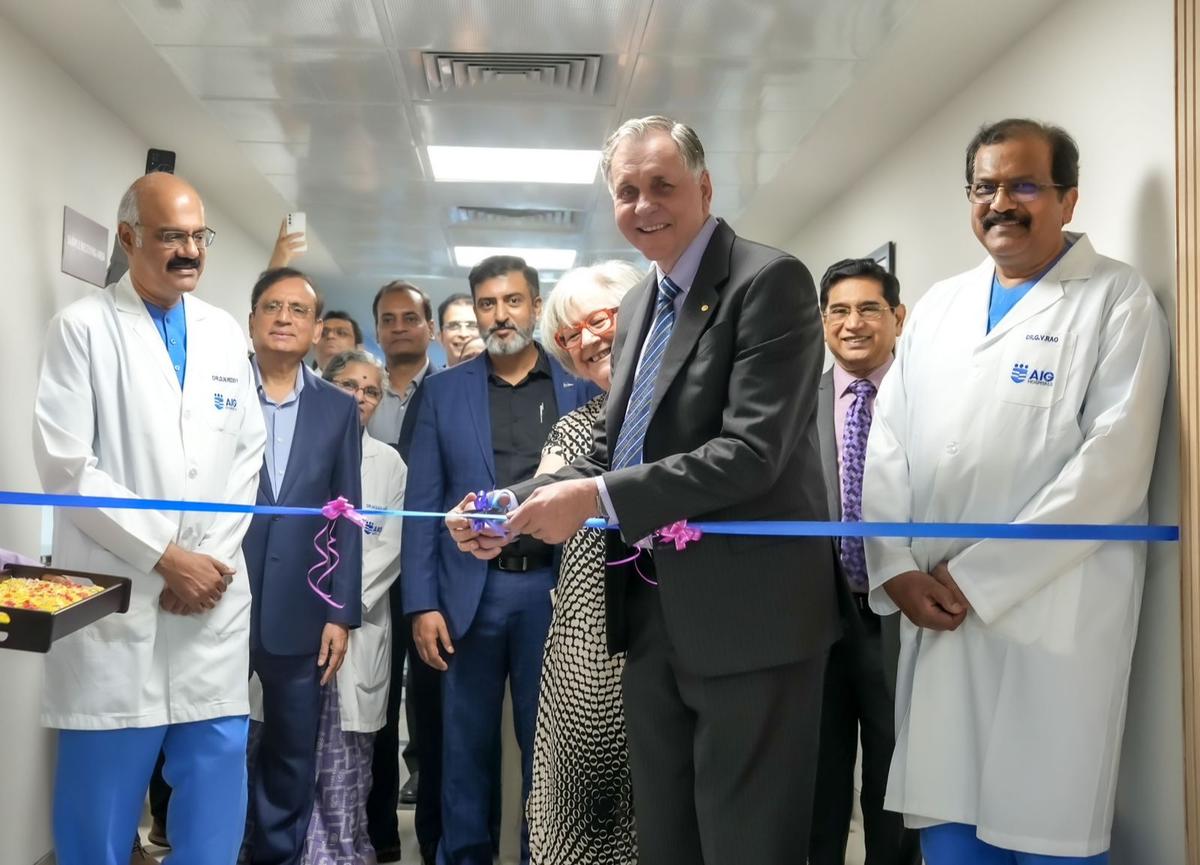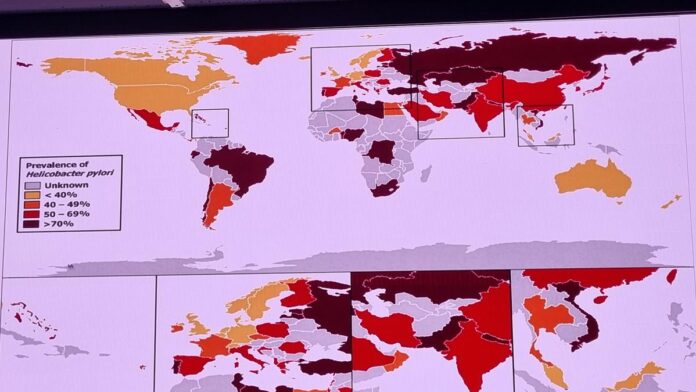
A slide displaying the global prevalence of Helicobacter pylori, with India showing an infection rate of over 50% of its population.
| Photo Credit: Siddharth Kumar Singh
With Helicobacter pylori (H. pylori) infections affecting an estimated 50% to 60% of the population in India, the nation faces a significant public health challenge. This bacterial infection, which often begins in childhood, is almost 10 times more prevalent than diabetes in the country and is a major cause of chronic gastritis, peptic ulcers and even stomach cancer, said doctors.
To combat this widespread issue, AIG Hospitals in Hyderabad inaugurated the Barry Marshall Centre for H. Pylori Research on Friday (November 8). The centre was inaugurated by Dr. Barry Marshall, who won the 2005 Nobel Prize in Physiology for the discovery of the bacterium and its link to ulcers and gastritis.
Helicobacter pylori (H. pylori) is a kind of bacteria that can live in the stomach. People usually get it as children, and it can stay in the body for years without causing problems. Even though the stomach has strong acid, H. pylori survives by making a substance that weakens the acid. Over time, this bacteria can harm the stomach’s protective layer, leading to irritation and sometimes causing painful sores called ulcers.
At the inauguration, Dr. Barry Marshall expressed optimism about the new centre’s mission. “By focusing on both prevention and treatment, we hope to significantly reduce stomach cancer rates in India,” he said, while highlighting the crucial role of early detection and intervention.
“India’s H. pylori strains exhibit distinct genetic traits, which necessitate targeted research into infection patterns and treatment responses. This centre will focus on identifying specific risk factors for Indians and developing customised therapies to address this significant health threat,” said Dr. D. Nageshwar Reddy, chairman of AIG Hospitals.

Nobel laureate Barry Marshall inaugurating the Barry Marshall Centre for H. Pylori Research at AIG Hospitals in Hyderabad on Friday.
Dr. Marshall further explained the transmission risks of H. pylori, noting that it can spread from person to person, primarily through saliva. “Close contact, like kissing or sharing utensils, can pass it along,” he stated, adding that contaminated food, water or poor hygiene especially in areas with crowded living conditions or limited access to clean water and sanitation also contribute to its spread. “Since it is often acquired in childhood, children are particularly at risk in environments where H. pylori is prevalent,” he added.
Dr. Marshall further said that most people with H. pylori don’t have symptoms, but when they do, it may include burning stomach pain, bloating, burping, nausea or vomiting. Some may also lose their appetite and experience weight loss. While many are infected in childhood without symptoms, they often don’t appear until late teens or adulthood, particularly if the infection causes ulcers or digestive problems.
Dr. Reddy highlighted that one of the centre’s primary goals is to enhance diagnostic protocols for both symptomatic and asymptomatic individuals. “For those above 50 who experience persistent stomach pain or digestive issues, endoscopy and non-invasive diagnostic tools, such as the urea breath test, stool antigen test and serology, will be recommended as first-line options,” he said.
The Barry Marshall Centre is named in honour of Dr. Barry Marshall, who, along with Robin Warren, was awarded the Nobel Prize in Medicine in 2005 for proving that H. pylori is the main cause of peptic ulcers, dispelling the previously held belief that ulcers were caused by stress or spicy foods. In a bold experiment, Dr. Marshall had even ingested the bacteria himself to demonstrate its role in gastritis and stomach ulcers, thereby confirming their ground breaking theory.
Published – November 08, 2024 06:08 pm IST
